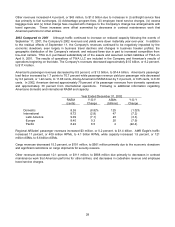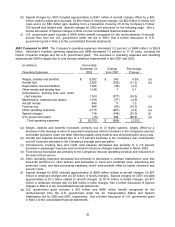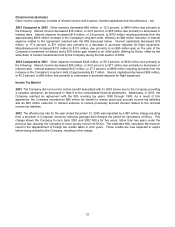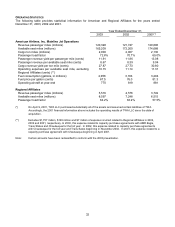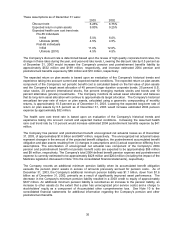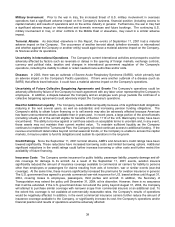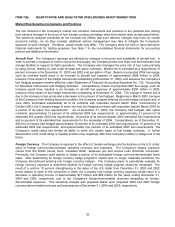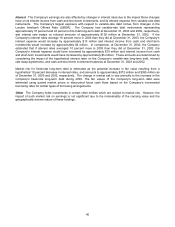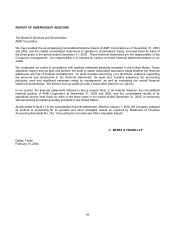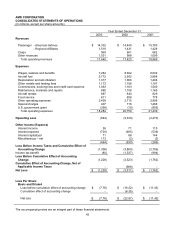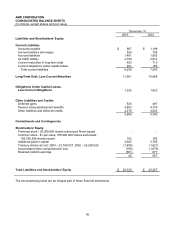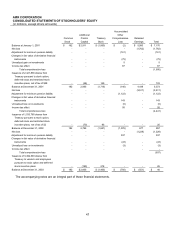American Airlines 2003 Annual Report Download - page 40
Download and view the complete annual report
Please find page 40 of the 2003 American Airlines annual report below. You can navigate through the pages in the report by either clicking on the pages listed below, or by using the keyword search tool below to find specific information within the annual report.38
Military Involvement Prior to the war in Iraq, the increased threat of U.S. military involvement in overseas
operations had a significant adverse impact on the Company’s business, financial position (including access to
capital markets) and results of operations and on the airline industry in general. Furthermore, the war in Iraq had
a significant adverse impact on international and domestic revenues and future bookings. The continuing U.S.
military involvement in Iraq, or other conflicts in the Middle East or elsewhere, may result in a similar adverse
impact.
Terrorist Attacks As described elsewhere in this Report, the events of September 11, 2001 had a material
adverse impact on the Company. The occurrence of another terrorist attack (whether domestic or international
and whether against the Company or another entity) would again have a material adverse impact on the Company,
its finances and/or its operations.
Uncertainty in International Operations The Company's current international activities and prospects could be
adversely affected by factors such as reversals or delays in the opening of foreign markets, exchange controls,
currency and political risks, taxation and changes in international government regulation of the Company's
operations, including the inability to obtain or retain needed route authorities and/or slots.
Diseases In 2003, there was an outbreak of Severe Acute Respiratory Syndrome (SARS), which primarily had
an adverse impact on the Company’s Pacific operations. If there were another outbreak of a disease (such as
SARS) that affects travel behavior, it could have a material adverse impact on the Company’s operations.
Uncertainty of Future Collective Bargaining Agreements and Events The Company’s operations could be
adversely affected by failure of the Company to reach agreement with any labor union representing the Company’s
employees. In addition, a dispute between the Company and an employee work group (outside the confines of a
collective bargaining agreement) could adversely impact the Company’s operations.
Need for Additional Liquidity The Company needs additional liquidity because of its significant debt obligations
maturing in the next several years, as well as substantial, and increasing pension funding obligations. The
Company’s ability to obtain future financing or to sell assets may also be adversely affected because American
has fewer unencumbered assets available than in years past. In recent years, a large portion of the aircraft assets
(including virtually all of the aircraft eligible for benefits of Section 1110 of the U.S. Bankruptcy Code) have been
encumbered. The ability to borrow against or sell those assets on acceptable terms is uncertain and, in any event,
those assets may not maintain their current market value. To maintain sufficient liquidity as the Company
continues to implement the Turnaround Plan, the Company will need continued access to additional funding. If the
revenue environment deteriorates beyond normal seasonal trends, or the Company is unable to access the capital
markets, it may be unable to fund its obligations and sustain its operations in the long-term.
Credit Ratings Since the September 11, 2001 terrorist attacks, AMR’s and American’s credit ratings have been
lowered significantly. These reductions have increased borrowing costs and limited borrowing options. Additional
significant reductions in the credit ratings could further increase borrowing or other costs and further restrict the
availability of future financing.
Insurance Costs The Company carries insurance for public liability, passenger liability, property damage and all-
risk coverage for damage to its aircraft. As a result of the September 11, 2001 events, aviation insurers
significantly reduced the amount of insurance coverage available to commercial air carriers for liability to persons
other than employees or passengers for claims resulting from acts of terrorism, war or similar events (war-risk
coverage). At the same time, these insurers significantly increased the premiums for aviation insurance in general.
The U.S. government has agreed to provide commercial war-risk insurance for U.S. based airlines until August 31,
2004, covering losses to employees, passengers, third parties and aircraft. In addition, the Secretary of
Transportation may extend the policy until December 31, 2004, at his discretion. However, there is no assurance
that it will be extended. If the U.S. government does not extend the policy beyond August 31, 2004, the Company
will attempt to purchase similar coverage with narrower scope from commercial insurers at an additional cost. To
the extent this coverage is not available at commercially reasonable rates, the Company’s results of operations
would be negatively affected. In addition, in the event commercial insurance carriers further reduce the amount of
insurance coverage available to the Company, or significantly increase its cost, the Company’s operations and/or
financial position and results of operations would be adversely affected.


